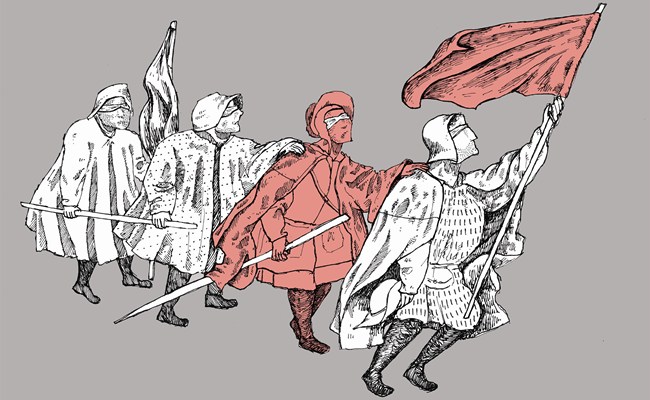Eve Haque states that the two most recurrent schools of thought on nationalism in conventional scholarship is primordialism and modernism. While describing primordialism, she mentions how language is a central element around which the nation is organized. Johann Gottfried Herder is presented as linking the ideas of reason and language by stating how each nation speaks in the manner it thinks and thinks in the manner it speaks. And Herder believed that integrating and sustaining the power of language would result in the conscious fostering of a common linguistic medium and the emergence of a “people”; thus, leading to the belief of differing from those that speak other languages. And as Haque writes, this led Herder into believing that intermixture of nationalities would be avoided and the idea of the nation as a separate entity based on a common language would be created. On the other hand, Haque describes that in the modernist account, the difference in believing in language’s role in nationalism lies in regarding standard national language as emerging through the process of modernity by tracing it back to the French Revolution. In modernist thinking, it is believed that centralization of education, the industrialization of societies, and print capitalism (newspapers in particular) were significant factors in the process of constructing what Benedict Anderson called “imagined communities” (2015, 317-320).
I believe that among the two mentioned theories, primordialist account of nationalism can better find inspirations from the idea of linguistic relativity. In Gerrit Dimmendaal’s article, we can see how the term “linguistic relativism” is linked with Benjamin Lee Whorf who summarizes his hypothesis by stating that speakers of different languages have somewhat different views of the world, and somewhat different habitual thought; their language and cultural knowledge are in a different relationship to each other. In other words, Whorf believed that speakers of different languages did not live in the same world but in somewhat different worlds (2015, 19). I believe that such an account of linguistic relativism implies that the different experiences of the world lead to uniting people that speak the same language, as Herder argued. And this account of different worlds leading to the creation of communities that speak the same language cannot solely be linked to modern developments as the idea of linguistic relativism transcends such historical developments and links language with cognition, which can be observed even in the earliest civilizations that spoke a language, had a specific culture; and thus, experienced the world similarly.
References
Dimmendaal, Gerrit. “Semantic Categorization and Cognition.” In The Routledge Handbook of Linguistic Anthropology, edited by Nancy Bonvillian, 13-26. Taylor & Francis Group, 2015.
Haque, Eve. “Language and Nationalism.” In The Routledge Handbook of Linguistic Anthropology, edited by Nancy Bonvillian, 317-328. Taylor & Francis Group, 2015.

Leave a comment